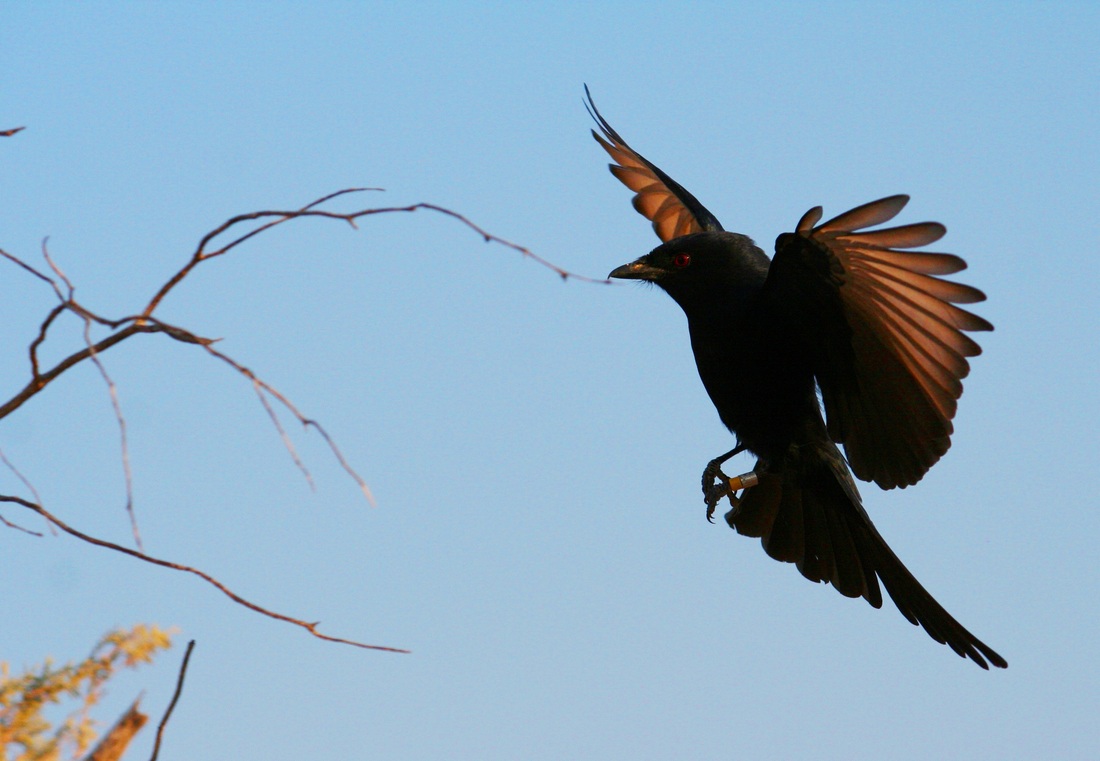So the paper is:
Flower et al (2014) Deception by flexible alarm mimicry in an African Bird. 344: 513-516
The problem with using these false alarm calls to gain food from other species, usually food that drongos are unable to gain themselves, is that if you are deceptive too often then your hosts will stop responding. However, these host species don’t just have their food stolen by drongos, they actually use drongos as part of their vigilance system as drongos will alarm at actual predators. Thus there is an interesting ‘mutualism’ that exists within this system. This investigation sought to understand how drongos maximize their gain from these repeated interactions.
Natural observations of this wild population showed that drongos exclusively use mimetic alarm calls in 42% of false alarms and a combination of mimetic and drongo specific calls in a further 27%. To investigate these patterns the researchers carried out a playback experiment using four drongo generated call types: 1) a control territorial call 2) drongo-specific alarm 3) mimic of glossy starling (Lamprotornis nitens) alarm and 4) mimic of pied babbler alarm. The experiment was carried out on groups of habituated pied babblers, a host species for the drongos. Pied babblers were slower to return to foraging after mimetic alarms than drongo specific ones, thus showing that mimetic alarm calls produce a stronger response. They then carried out a second experiment where they played back three calls in one of four treatments: 1) All drongo-specific alarms 2) All mimetic starling alarms 3) two drongo followed by a starling and 4) two starling followed by a drongo alarm. They found that pied babblers habituated to treatments of all one type but not to the treatments that varied. Showing that varying the calls you use has benefits for the drongo. These experimental results fit with the natural data that showed in instances of repeated attempts at theft on the same individual that drongos changed the false alarm call that they used on 74% of occasions. Drongos were more likely to change if their previous attempt had failed.
This paper shows that drongos avoid host species habituating to false alarm calls by varying the mimetic false alarms that they use and thus avoiding frequency dependent constraints.
This paper has a great blend of natural observation and carefully designed experiments. The results speak for themselves and tell an interesting story of how birds in the wild adjust to problems that are familiar to many people. It shows the value of working at a research site with multiple habituated species that associate and interact in interesting ways, and thus the value of long-term research stations.
Some of the media coverage seems to have sensationalized this work, going much further with their assertions than the authors did. Some have even suggested that these birds have ‘theory of mind’. Sciencemag noted that Tom (Dr Flower) is doing some current work to further investigate drongos tactics and learning, work that I assisted with in the Kalahari. From my observations while performing these experiments the drongos seemed to use simple rules and were not as clever as we had hoped. However, that does not detract from the brilliance of their behaviour: many complex behaviours and structures are made using simple rules, e.g. spider’s webs and wasp nests. Even some seemingly complex human behaviours are governed by simple rules. The amazing adaptability of evolution is shown by such seemingly complex behaviours. In fact the authors use examples such as the changing of cell surface proteins by influenza as an analogue to drongo behaviour, and I’m pretty sure that virus’s don’t have theory of mind!
Here are some links to other media coverage:
http://news.sciencemag.org/biology/2014/05/african-bird-cries-wolf-steal-food?rss=1
http://whyfiles.org/2014/deceptive-bird-lies-to-steal-food/
http://www.nbcnews.com/science/weird-science/african-bird-uses-sound-effects-bamboozle-other-species-n94256
More drongo papers:
Flower et al (2013) The ecological economics of kleptoparasitism: pay-offs from self-foraging versus kleptoparasitism. Journal of Animal Ecology 82:245-255
Flower & Gribble (2012) Kleptoparasitism by attacks versus alarm calls in fork-tailed drongos. Animal Behaviour 83:403-410
Ridley & Child (2009) Specific targeting of host individuals by a kleptoparasitic bird. Behavioral Ecology & Sociobiology 63: 1119-1126.


 RSS Feed
RSS Feed
